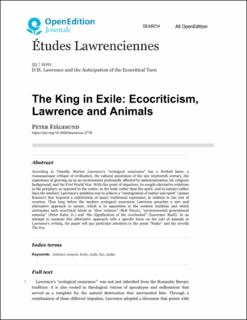The King in Exile: Ecocriticism, Lawrence and Animals
Peer reviewed, Journal article
Published version
Permanent lenke
https://hdl.handle.net/11250/3026982Utgivelsesdato
2021Metadata
Vis full innførselSamlinger
Originalversjon
Fjågesund, P. (2021). The King in Exile: Ecocriticism, Lawrence and Animals. Études Lawrenciennes, 53. https://doi.org/10.4000/lawrence.2778Sammendrag
According to Timothy Morton Lawrence’s “ecological awareness” has a fivefold basis: a rousseauesque critique of civilization, the cultural pessimism of the late nineteenth century, the experience of growing up in an environment profoundly affected by industrialization, his religious background, and the First World War. With this point of departure, he sought alternative solutions in the periphery as opposed to the centre, in the body rather than the spirit, and in instinct rather than the intellect. Lawrence’s ambition was to achieve a “reintegration of matter and spirit” (James Krasner) that required a redefinition of man’s traditional supremacy in relation to the rest of creation. Thus long before the modern ecological awareness Lawrence preaches a new and alternative approach to nature, which is in opposition to the western tradition and which anticipates such ecocritical labels as “slow violence” (Rob Nixon), “environmental generational amnesia” (Peter Kahn Jr.) and “the dignification of the overlooked” (Lawrence Buell). In an attempt to examine this alternative approach with a specific focus on the role of animals in Lawrence’s writing, the paper will pay particular attention to the poem “Snake” and the novella The Fox.

